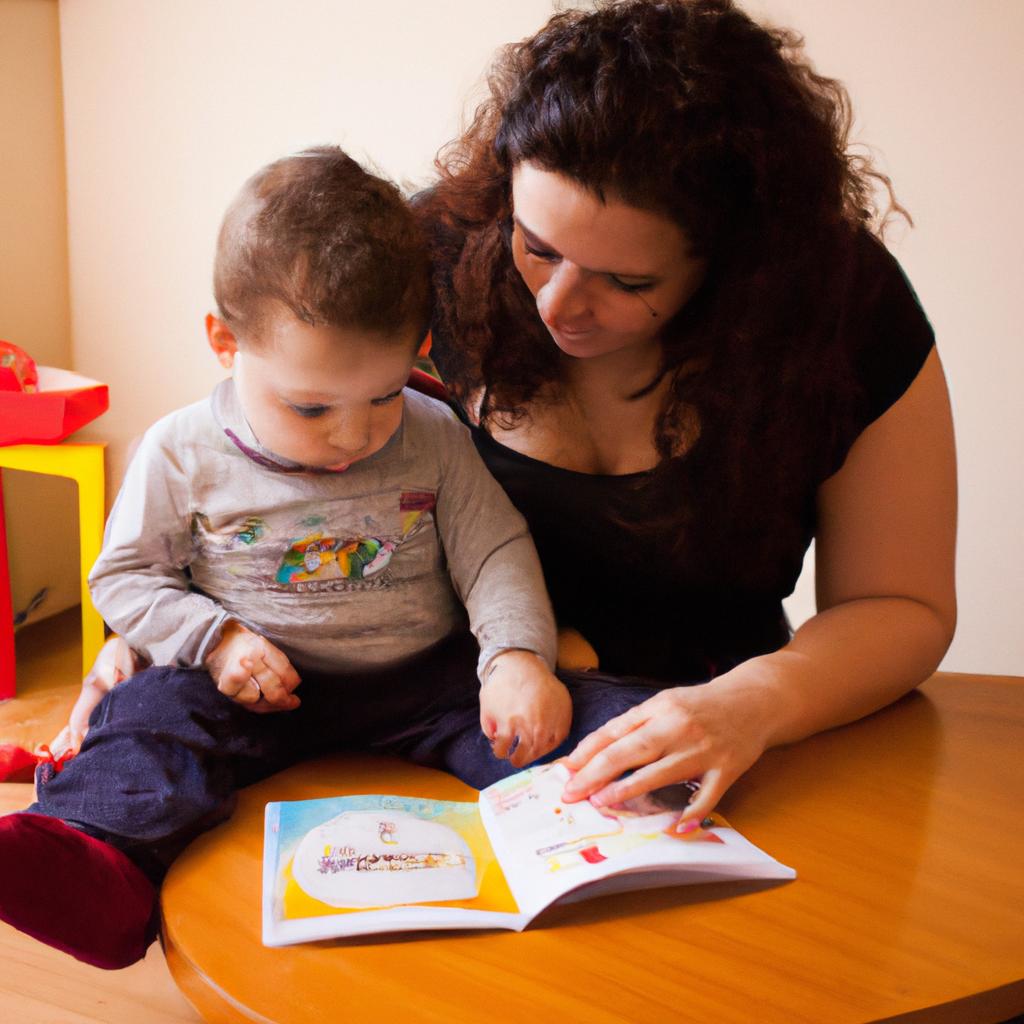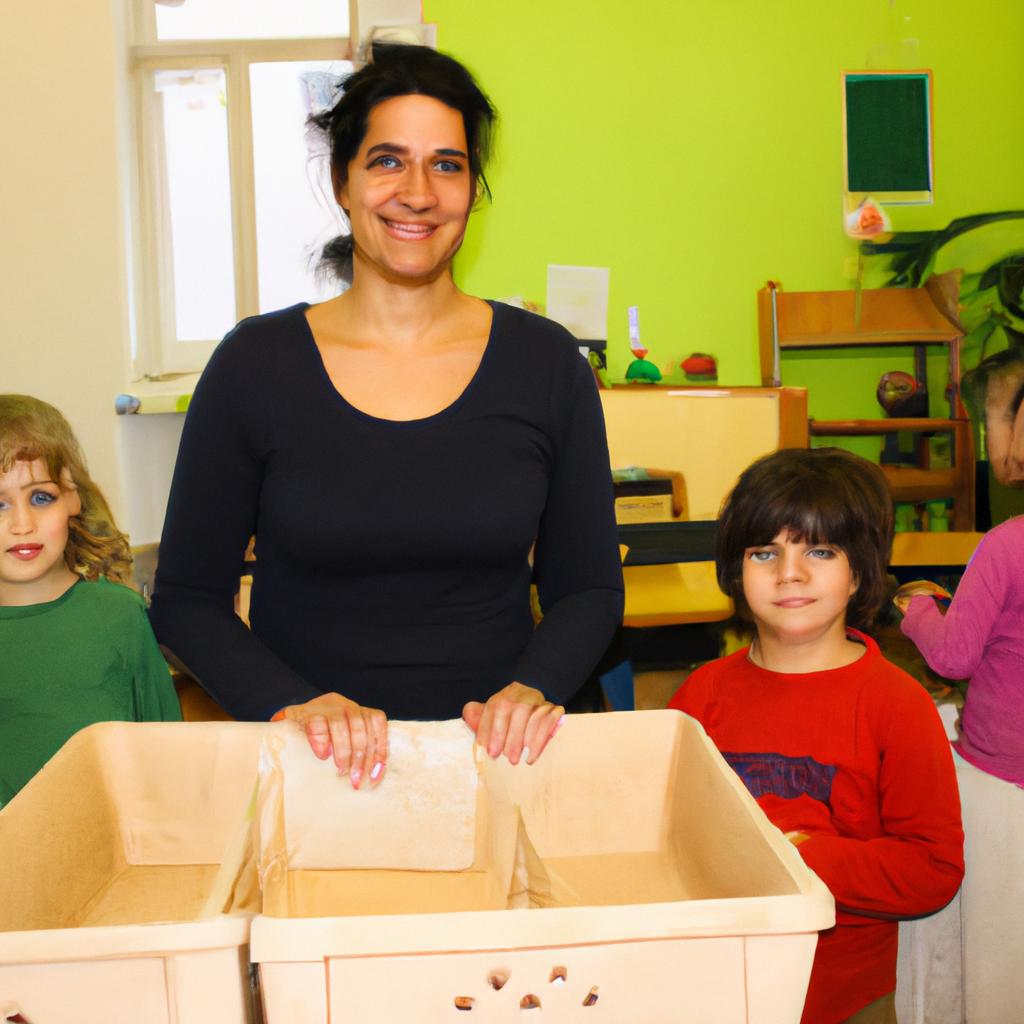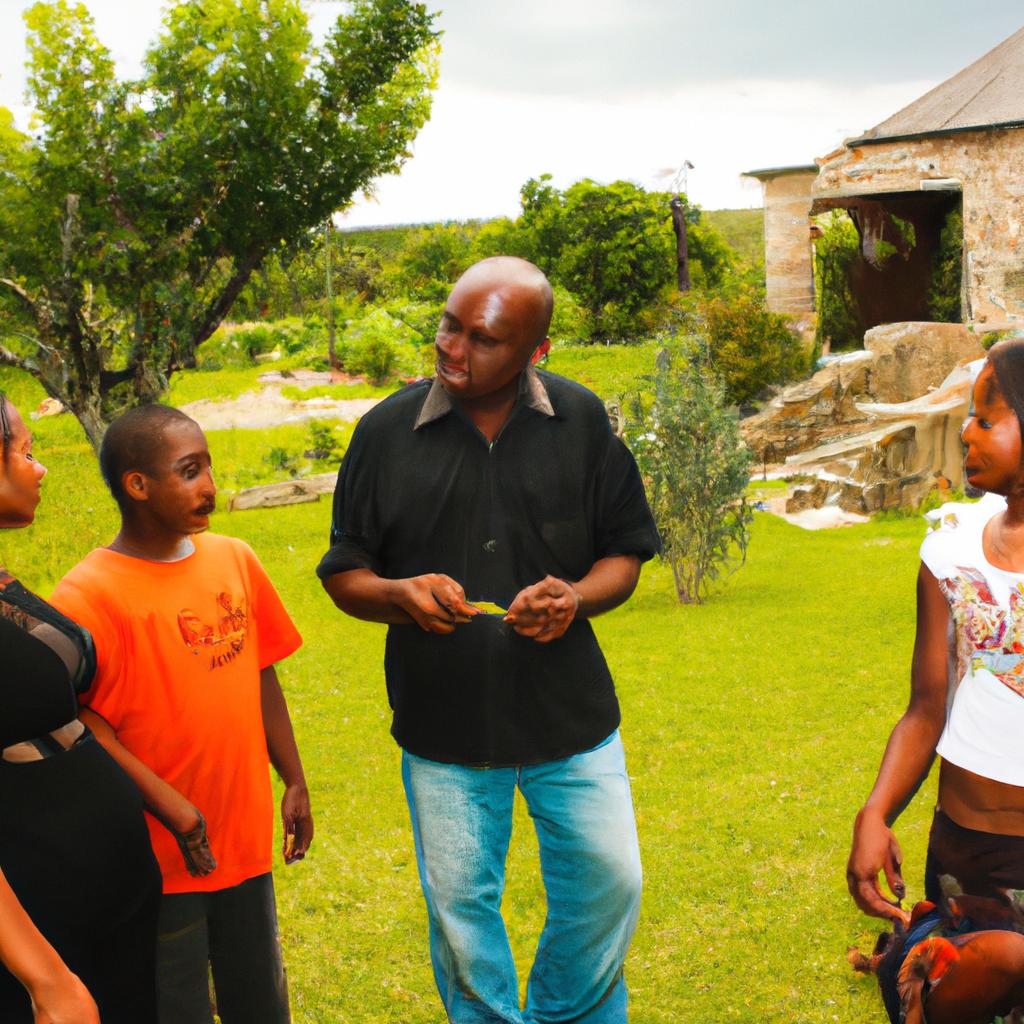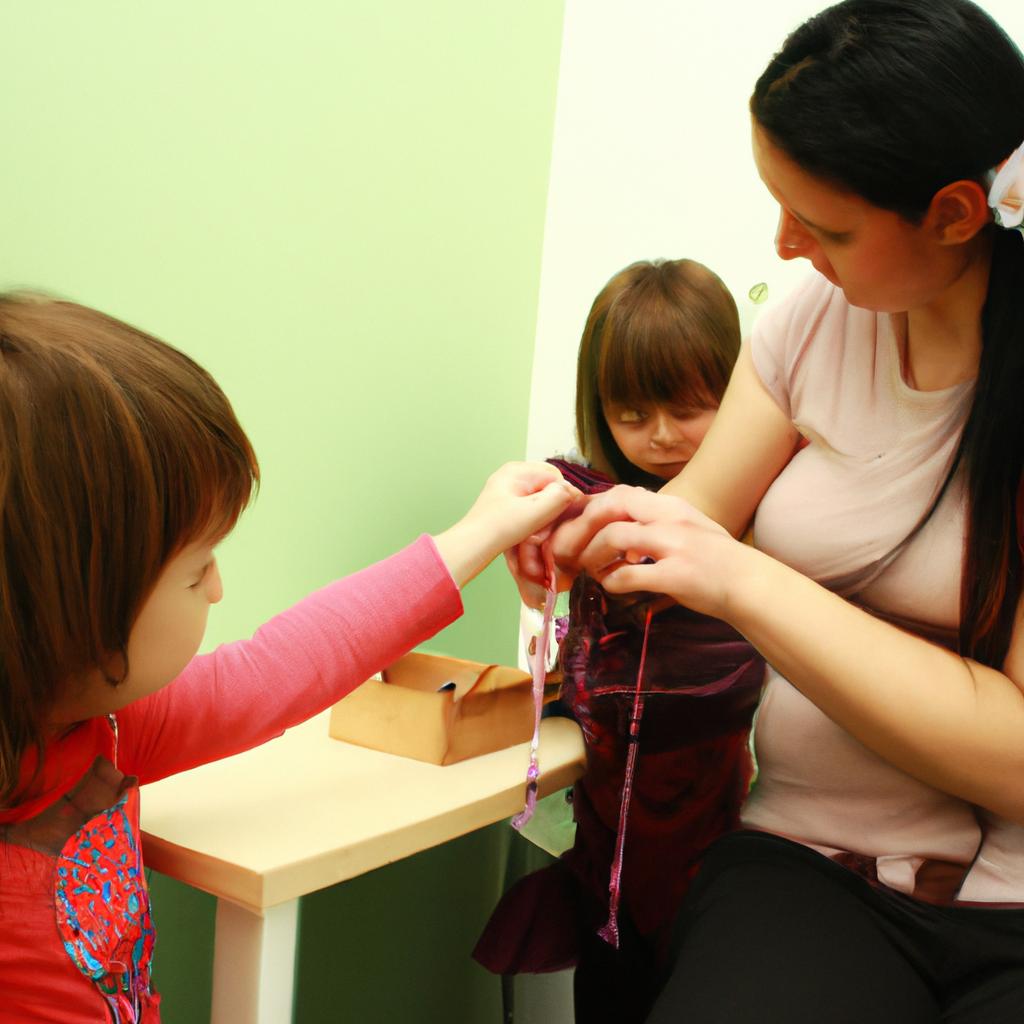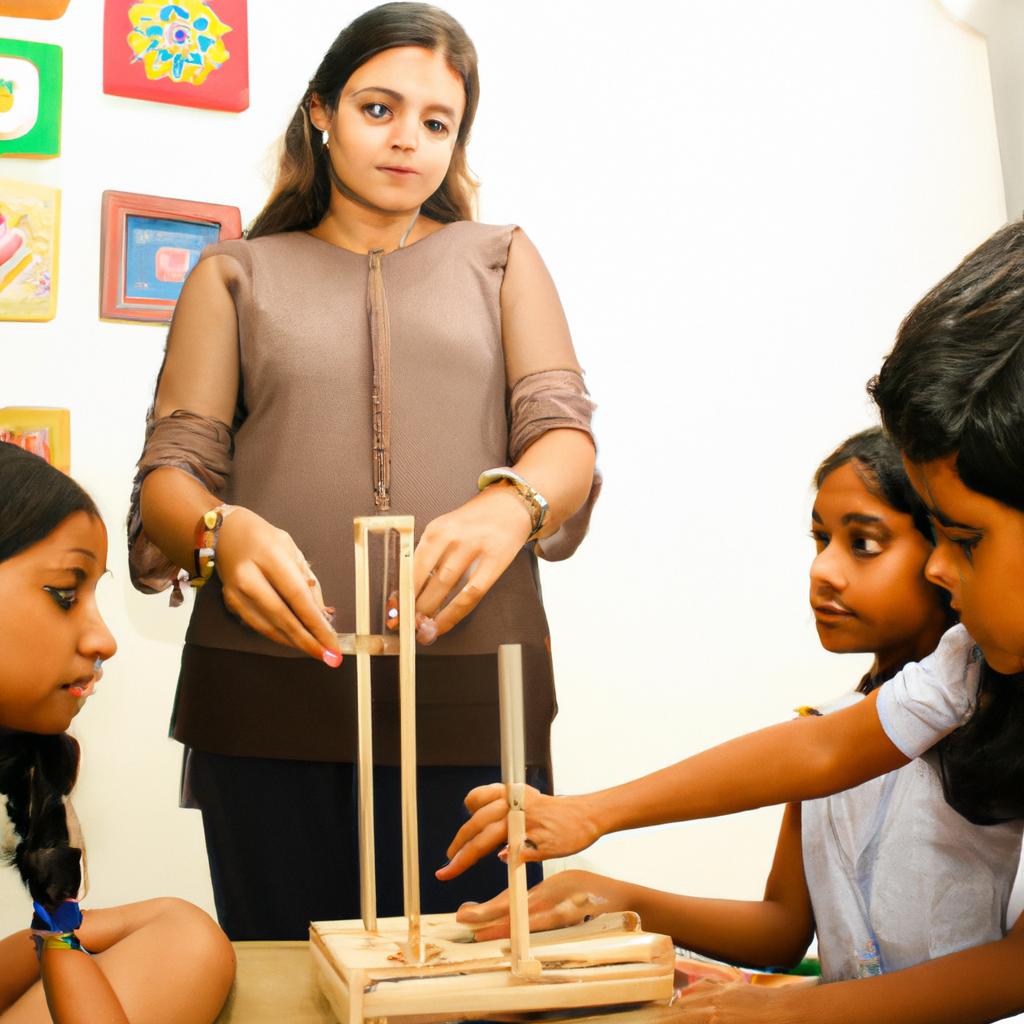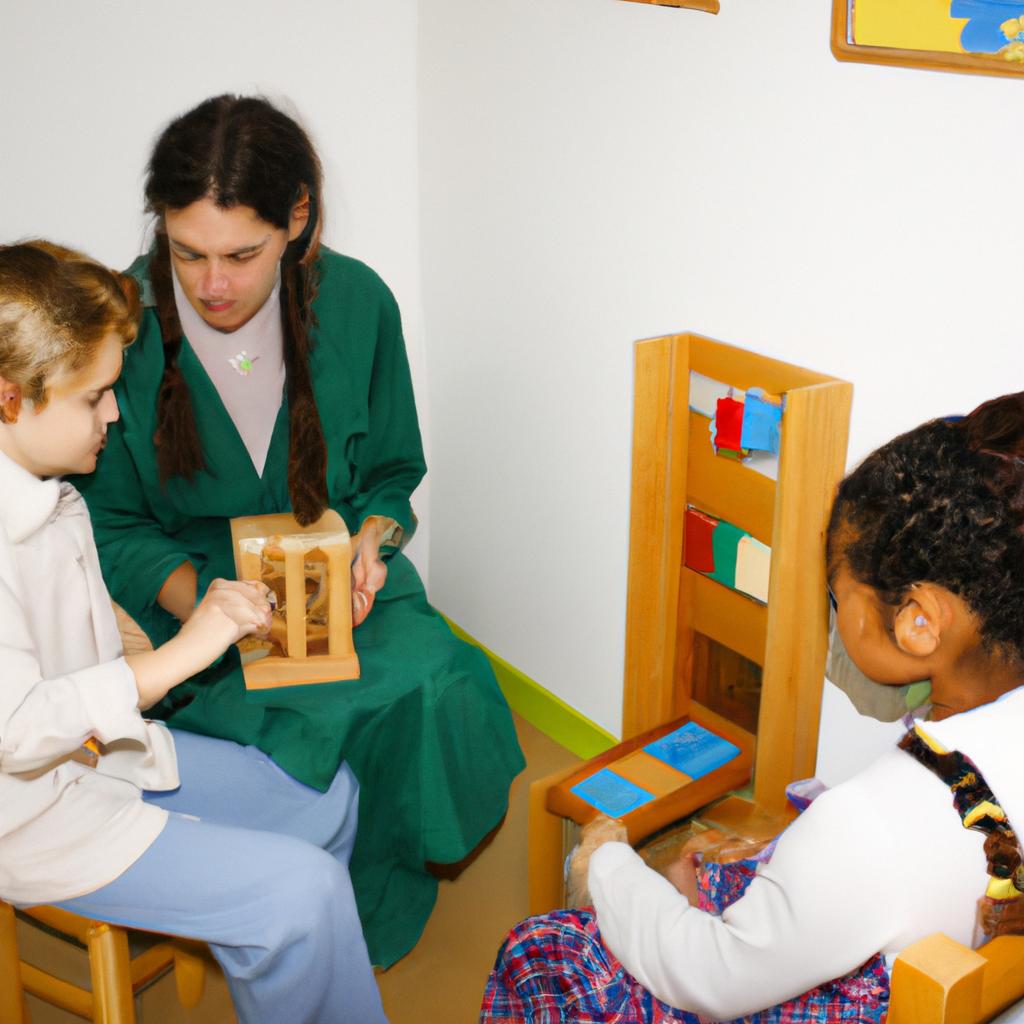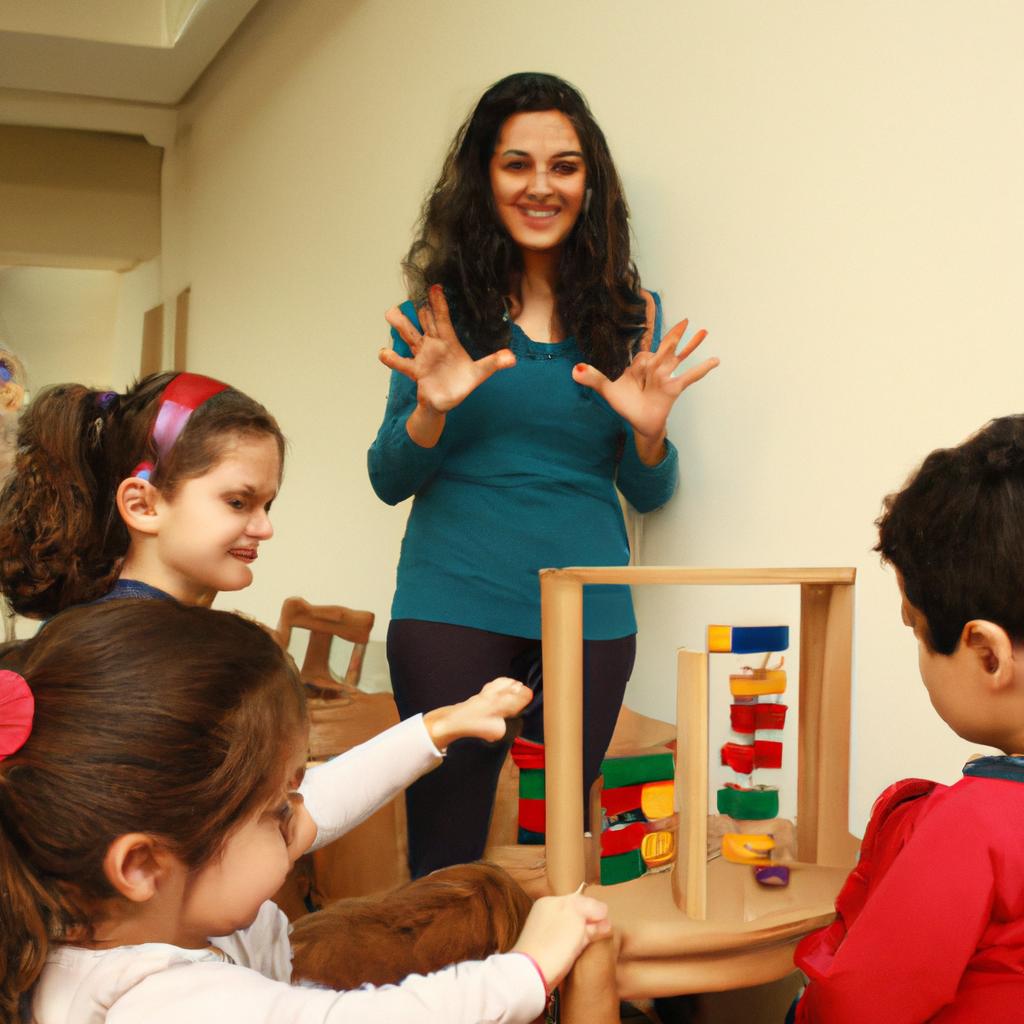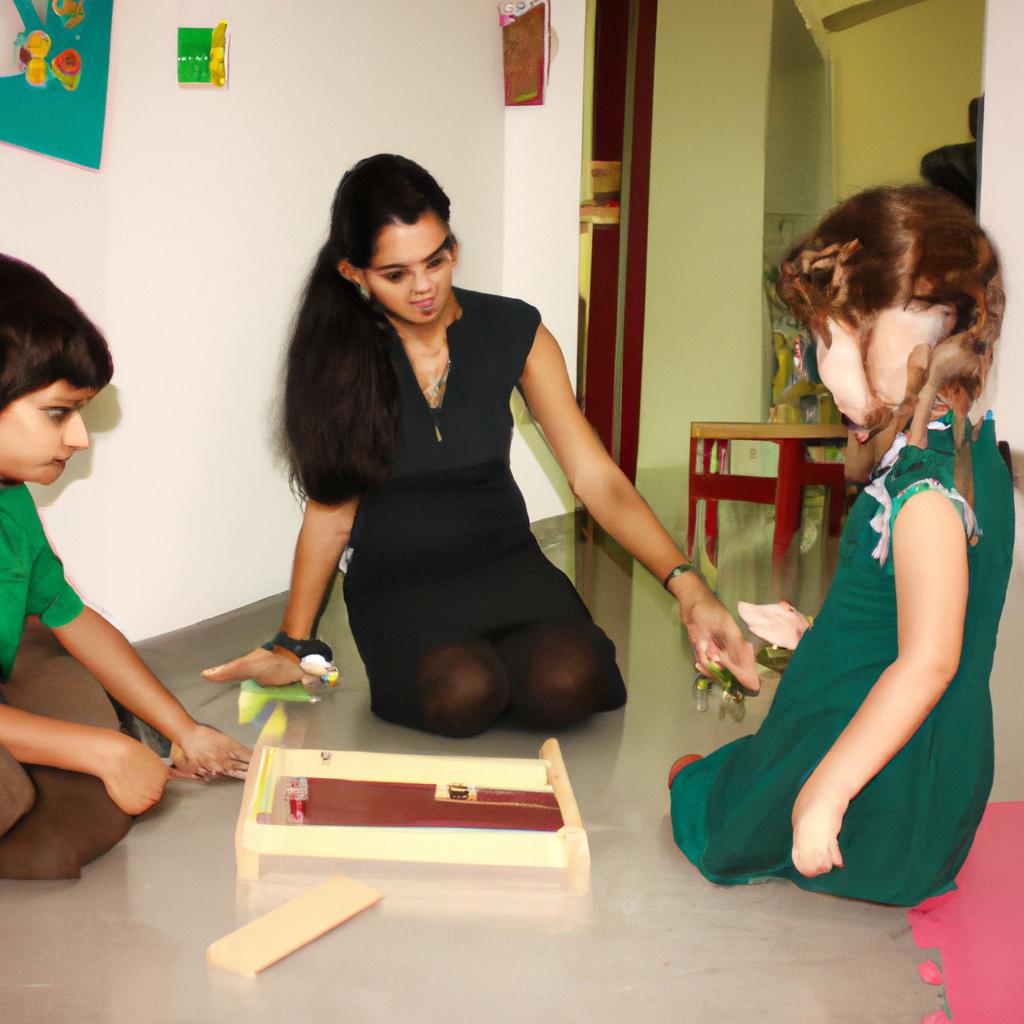Montessori schools have long recognized the importance of parental involvement in enhancing a child’s educational experience. One compelling example that underscores this point is the case of Sarah, a preschool student at Montessori School X. Sarah’s parents, Mr. and Mrs. Johnson, actively volunteered their time within the school community, participating in various activities such as assisting with classroom projects, organizing fundraising events, and even serving on the Parent-Teacher Association (PTA). As a result, Sarah not only thrived academically but also developed a strong sense of belonging and connection to her school environment.
The role of parent volunteers in Montessori schools extends beyond simply supporting administrative tasks or event organization; it serves as an avenue for parents to actively engage with their children’s learning journey. Research has consistently shown that when parents are involved in their children’s education, students exhibit higher academic achievements, improved behavior, increased motivation, and greater self-esteem. By fostering a collaborative partnership between parents and educators, volunteer opportunities in Montessori schools hold immense potential for enriching both the educational experience of individual students like Sarah and the overall learning community. In this article, we will delve into the various volunteer opportunities available within Montessori schools and explore how they contribute to enhancing the educational experience for students.
One of the most common ways parents can get involved in a Montessori school is by assisting in the classroom. This could involve helping with practical life activities, such as preparing snack or maintaining the classroom environment. By being present in the classroom, parents can witness firsthand how their child engages with the Montessori materials and observe their progress and growth.
Additionally, parent volunteers can contribute to organizing and participating in special events and field trips. These experiences provide valuable opportunities for children to learn outside of the traditional classroom setting and explore new interests. Parents can assist in planning educational outings or even share their own expertise or hobbies with the students.
Furthermore, parent involvement extends beyond direct interactions with students. They can also play an active role in supporting fundraising efforts, which help provide resources and materials that enhance the overall learning environment. By participating in initiatives like bake sales, auctions, or donation drives, parents contribute to creating a more enriching educational experience for all students at the school.
Engaging parents through volunteer opportunities not only benefits individual students but also strengthens the sense of community within a Montessori school. When parents actively participate in their child’s education, they become invested stakeholders who feel connected to the school’s mission and values. This sense of belonging fosters open lines of communication between parents and educators, allowing for collaboration on important decisions that impact student learning.
In conclusion, parental involvement through volunteer opportunities plays a vital role in enhancing the educational experience within Montessori schools. Through their active engagement in classrooms, events, fundraising efforts, and community-building initiatives, parents create a supportive environment where students thrive academically and personally. The partnership between parents and educators nurtures a holistic approach to education that focuses on each child’s individual needs while fostering a strong sense of belonging within the school community.
Benefits of Parent Volunteerism in Montessori Schools
One compelling example that highlights the positive impact of parent volunteerism in Montessori schools is the case of Sarah and her daughter Emma. Sarah, a working mother, decided to actively engage in volunteering at Emma’s school by assisting with various classroom activities and events. As a result, both Sarah and Emma experienced numerous benefits from this collaborative involvement.
Firstly, parental volunteerism fosters a sense of community within the Montessori school environment. By actively participating in their child’s education, parents establish connections not only with teachers but also with other families who share similar values and goals. This sense of belonging creates a supportive network for both children and parents alike, promoting communication and cooperation between all stakeholders involved.
Secondly, when parents contribute their time and skills as volunteers, they provide valuable resources to enhance educational experiences. For instance, through art workshops led by parent volunteers or science experiments conducted under their guidance, children gain exposure to diverse perspectives and hands-on learning opportunities beyond what can be achieved solely by teachers. Moreover, parent volunteers often bring unique talents such as storytelling or musical abilities into the classroom setting, enriching students’ learning experiences.
Furthermore, involving parents as volunteers strengthens the partnership between home and school. When parents actively participate in classroom activities or attend school events alongside their child, it reinforces the message that education is a joint effort shared by both parties. This collaboration enhances parental understanding of the Montessori philosophy and methodology while also providing an avenue for educators to learn more about each child’s individual needs and interests.
To evoke an emotional response among readers regarding the benefits of parent volunteerism in Montessori schools:
- Increased sense of connection: Parents feel part of a close-knit community where everyone supports one another.
- Enhanced learning experiences: Children have access to a wider range of activities facilitated by talented parent volunteers.
- Strengthened bond between home and school: Collaboration between parents and educators leads to a more holistic approach to education.
- Deepened understanding of Montessori philosophy: Parents gain firsthand experience of the principles that guide their child’s learning journey.
| Emotional Benefits | Social Benefits | Educational Benefits |
|---|---|---|
| Increased sense of fulfillment | Opportunity for networking | Exposure to diverse perspectives |
| Sense of belonging | Enhanced community spirit | Hands-on learning opportunities |
| Shared pride in accomplishments | Supportive network | Access to unique talents |
| Personal growth and development | Strengthened relationships | Reinforcement of home-school partnership |
In light of these advantages, it is clear that parent volunteerism plays a crucial role in fostering a positive educational environment within Montessori schools. By actively engaging parents as volunteers, not only are children provided with enriching experiences but also the entire school community benefits from enhanced collaboration and support. Building upon these benefits, let us now explore the various types of volunteer opportunities available in Montessori schools.
Types of Volunteer Opportunities in Montessori Schools
Building upon the understanding of the benefits of parent volunteerism in Montessori schools, it is important to explore the various types of volunteer opportunities available. By actively engaging parents in different roles within the school community, a collaborative and enriching environment can be fostered for both students and their families.
One example of a volunteer opportunity in a Montessori school is assisting with classroom activities. Parents can contribute by working alongside teachers to facilitate lessons or small group work, providing individualized attention to students who may benefit from additional support. This hands-on involvement allows parents to witness firsthand the unique approach used in Montessori education, strengthening their connection with their child’s learning process.
To further encourage parent involvement, schools often provide opportunities for volunteering outside the classroom as well. These can include organizing special events such as fundraising drives or school-wide celebrations. Through active participation in planning and executing these events, parents not only contribute to creating memorable experiences but also establish bonds with other families within the school community.
In addition to direct involvement, there are administrative volunteer positions that play a crucial role in maintaining an efficiently run Montessori school. These roles may involve tasks such as coordinating schedules, managing communication channels between staff and parents, or assisting with record-keeping. By taking on these responsibilities, parents have an opportunity to gain insight into the operational aspects of running a successful educational institution while supporting its smooth functioning.
Furthermore, some Montessori schools offer unique opportunities for parental engagement through specialized committees or advisory boards. These groups allow interested parents to participate in decision-making processes that shape policies and programs at the school level. Whether contributing expertise in particular areas like finance or curriculum development, or simply offering valuable perspectives as engaged stakeholders, these committee members play an integral part in shaping the overall direction of the school.
Emotional Bullet Points:
- A chance to actively contribute towards your child’s education
- Strengthening the bond with your child by participating in their daily activities
- Building connections and friendships within the school community
- Gaining a deeper understanding of Montessori education principles
Table: Examples of Volunteer Opportunities
| Classroom Activities | Special Events Organization | Administrative Tasks | Committee Involvement |
|---|---|---|---|
| Assisting lessons | Fundraising drives | Scheduling | Curriculum development |
| Small group work | School-wide celebrations | Communication | Finance management |
| Individualized attention | Event planning | Record-keeping | Policy development |
By actively embracing these volunteer opportunities, parents contribute to an inclusive and supportive environment where students can thrive academically and socially. Their involvement not only benefits their own children but also enhances the overall quality of education provided by the Montessori school.
Understanding the different types of volunteer roles available sets the stage for exploring how parents can get involved in a Montessori school. By taking advantage of these opportunities, parents can play an active role in supporting their child’s educational journey while fostering strong ties with the school community.
How to Get Involved as a Parent in a Montessori School
Previous section H2 (Transition): After exploring the various types of volunteer opportunities available in Montessori schools, let us now delve into how parents can actively get involved and contribute to their child’s educational journey.
Section:
Parent involvement plays a crucial role in the success of a Montessori school. By actively participating in volunteering activities, parents not only support their child’s development but also foster a strong sense of community within the school. To illustrate this point, consider the case study of Mr. and Mrs. Johnson, who became volunteers at their local Montessori school after witnessing the positive impact it had on their neighbor’s child.
Volunteering offers numerous benefits both for parents and students alike. Here are some compelling reasons why parents should seize these opportunities:
- Strengthening Relationships: Volunteering allows parents to build meaningful connections with teachers, staff members, and other families within the Montessori community.
- Active Engagement in Child’s Education: By being involved in volunteer activities, parents gain firsthand insight into their child’s educational experience, enabling them to better support their learning journey.
- Modeling Positive Behavior: When children see their parents engaged in volunteering efforts, they learn valuable lessons about empathy, compassion, and service to others.
- Creating Lasting Memories: Participating together in volunteer work creates shared experiences that will be cherished by both parent and child throughout their lives.
In addition to these emotional rewards, there is tangible evidence supporting the positive impact of parental involvement on academic outcomes. According to research conducted by Harvard University*, increased parent engagement correlates with higher student achievement levels across multiple subjects.
To further explore different ways parents can balance work commitments while engaging as volunteers at Montessori schools, please refer to the next section on “Tips for Balancing Work and Volunteer Commitments.”
*Reference: Henderson, A.T., & Mapp, K.L. (2002). A New Wave of Evidence: The Impact of School, Family, and Community Connections on Student Achievement. Austin, TX: Southwest Educational Development Laboratory.
Next section H2 (Transition): Now let us explore some valuable tips that can help parents effectively balance their work responsibilities with their volunteer commitments in a Montessori school.
Tips for Balancing Work and Volunteer Commitments
Enhancing parent involvement in a Montessori school can greatly benefit both the students and the overall learning environment. By actively participating in volunteer opportunities, parents can not only support their child’s education but also contribute to the growth and success of the entire community. This section will explore various ways for parents to get involved and provide practical tips for balancing work and volunteer commitments.
Imagine a scenario where a parent named Emily decides to become more involved in her child’s Montessori school. She recognizes that by volunteering her time and skills, she can make a positive impact on her child’s educational experience. Inspired by this realization, Emily explores different avenues through which she can contribute as an engaged parent.
Here are four key ways for parents like Emily to enhance their involvement:
- Classroom Assistance: Parents can offer assistance within the classroom setting by helping with activities, organizing materials, or supporting small groups of children during lessons.
- Event Planning: Taking part in event planning committees allows parents to help organize special occasions such as fundraisers, field trips, or cultural celebrations.
- Committee Membership: Joining committees focused on specific areas like curriculum development, outdoor education programs, or technology integration enables parents to have a direct influence on decision-making processes.
- Parent-Teacher Association (PTA) Involvement: Participating in PTA meetings and events fosters collaboration between families and educators while creating opportunities for networking and relationship-building.
To illustrate how these opportunities can be impactful, consider the following table showcasing real examples of parental involvements at a Montessori school:
| Volunteer Opportunity | Impact |
|---|---|
| Leading Art Workshops | Nurtures creativity among students |
| Coordinating Field Trips | Enhances experiential learning outside the classroom |
| Organizing Community Events | Fosters inclusivity and strengthens community bonds |
| Assisting English Language Learners | Supports linguistic and cultural diversity in the classroom |
By actively participating in volunteer opportunities, parents not only contribute to their child’s educational growth but also create a vibrant community within the Montessori school. The impact of parent involvement extends beyond individual students, positively influencing the overall learning environment and fostering a sense of belonging among all stakeholders.
Transitioning into the subsequent section about “The Impact of Parent Volunteerism on Montessori Students,” we can explore how such parental involvements shape students’ social-emotional development and academic achievements without delay.
The Impact of Parent Volunteerism on Montessori Students
Enhancing Parent Involvement: The Impact of Volunteerism in Montessori Schools
Balancing work and volunteer commitments can be a challenge for parents, but the benefits of parent involvement in Montessori schools are undeniable. Let’s consider an example to understand how parent volunteers contribute to the overall enhancement of a child’s education.
Imagine Sarah, a working mother who dedicates her free time to volunteering at her child’s Montessori school. Through her involvement, she takes on various roles such as assisting teachers during classroom activities, organizing educational events, and providing support to other parents. By actively participating in the school community, Sarah not only strengthens her bond with her child but also becomes a valuable resource for both educators and fellow parents.
The impact of parent volunteerism is multifaceted and encompasses several advantages:
- Enriching Learning Experiences: When parents actively engage in their children’s education by volunteering, they create opportunities for hands-on learning experiences that go beyond traditional classroom instruction.
- Fostering Collaboration: Parent volunteers foster collaboration among students, teachers, and families by creating a supportive network where everyone feels valued and included.
- Strengthening Community Connections: Volunteering allows parents to build connections within the wider community by collaborating with local businesses or organizations that share common goals related to education.
- Enhancing School Resources: Parent volunteers often contribute resources through fundraising efforts or donations, thereby helping expand the available tools and materials for student learning.
To illustrate these points further, we can refer to the following table:
| Advantages of Parent Volunteerism |
|---|
| Enriched learning experiences |
| Enhanced sense of belonging |
| Stronger community bonds |
| Increased availability of resources |
In conclusion, parent volunteerism plays a vital role in enhancing the Montessori experience for students. By incorporating their skills and dedicating their time, parents like Sarah contribute to a nurturing and supportive environment that benefits not only their own children but the entire school community. In the subsequent section, we will delve into strategies for creating a supportive environment for parent volunteers.
(Transition Sentence) Creating a Supportive Environment for Parent Volunteers involves implementing key practices that foster collaboration and encourage active involvement in the Montessori school community.
Creating a Supportive Environment for Parent Volunteers
Having established the positive impact of parent volunteerism on Montessori students, it is essential to delve into how schools can create an environment that fosters and supports such involvement. By developing effective strategies and providing meaningful opportunities, Montessori schools can enhance parent engagement and contribute to a thriving educational community.
Creating a Supportive Environment for Parent Volunteers:
To illustrate the potential benefits of a supportive environment, let us consider a hypothetical case study involving Maplewood Montessori School. At Maplewood, parents are actively encouraged to participate in various volunteer activities throughout the academic year. This inclusive approach not only strengthens the bond between home and school but also enriches the learning experience for everyone involved.
Bellow are four key elements that contribute to fostering a supportive environment for parent volunteers:
-
Clear Communication Channels:
- Regularly updated newsletters or emails with information about upcoming volunteering opportunities.
- A dedicated webpage or online platform where parents can access current volunteer needs.
- Open lines of communication between teachers, administrators, and parents to address any questions or concerns regarding volunteer roles.
-
Flexibility in Time Commitments:
- Offering diverse volunteering options (e.g., classroom support, organizing events) allows parents to choose activities that align with their schedules.
- Providing both short-term commitments (such as assisting during field trips) and long-term projects (like joining committees) accommodates varying levels of availability.
-
Recognition and Appreciation:
- Acknowledging the valuable contributions made by parent volunteers through regular expressions of gratitude.
- Creating recognition programs or awards to highlight exceptional efforts from individuals who go above and beyond expectations.
-
Training and Resources:
- Conducting orientation sessions for new volunteers to familiarize them with school policies and procedures.
- Offering ongoing training opportunities to enhance the volunteers’ skills, such as workshops on effective communication or Montessori philosophy.
Table: Volunteer Opportunities at Maplewood Montessori School
| Volunteer Role | Time Commitment | Responsibilities |
|---|---|---|
| Classroom Support | Flexible (weekly, bi-weekly, monthly) | Assist teachers during lessons and activities. |
| Event Coordinator | Varies depending on event | Plan and organize school-wide events and fundraisers. |
| Library Assistant | Flexible (weekly) | Maintain library organization and assist students with book selection. |
| Gardening Team | Monthly | Tend to the school garden alongside students. |
In conclusion, by establishing clear communication channels, providing flexibility in time commitments, offering recognition and appreciation, as well as providing necessary training and resources, schools can create a supportive environment that enhances parent involvement in volunteer activities. The case study of Maplewood Montessori School exemplifies how these elements contribute to a thriving educational community where parents are actively engaged in their children’s learning journey. Such an inclusive approach not only benefits the students but also strengthens the overall sense of belonging within the school community

